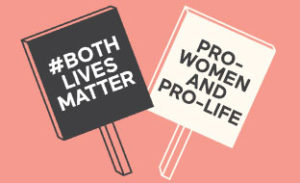As part of a series of reflections for the 50th anniversary of the 1967 Abortion Act, Dawn McAvoy, Both Lives Matter, considers how, with the benefit of fifty years of lived experience and government data, we can now understand the impact of that law change. Has the ’67 Act benefited or harmed women?
We hope that these contributions from people across the British Isles and Ireland will provide some much needed context and perspective to this sensitive issue.
The 27 October is the 50th anniversary of the 1967 Abortion Act. Here in Northern Ireland we have, for the most part, been shielded from the consequences of that Act, so perhaps it’s understandable when there is ignorance of its true impact. That supposedly limited reform of the law that we in NI still live within, has led to a situation today where abortion is so common in Great Britain that one in three women by the age of 45 will have an abortion. One in four pregnancies end in abortion and over 90 per cent of babies diagnosed with Down Syndrome are aborted.
Those statistics alone should serve as a warning against even seemingly minor reform to abortion law here. But there are those, who are still so committed to the ideology of abortion, that they will ignore context, deny evidence and reject truth in order to evangelise abortion. Today, across the island of Ireland, we face unprecedented lobbying to increase access to abortion.
Surely it is foolish to repeat the mistakes of the past and learn nothing from them?
What do we do then, when an ideology continues to be promoted at the expense of historical, geographic and social context? How do we respond when that ideology is in blatant disregard of medical and social evidence, and many individuals personal lived experience?
We are fortunate, we have fifty years of government data, fifty years of personal stories, and fifty years of medical and social progress to consider. We have the benefit of hindsight.
Fifty years ago, politicians introduced legislation across the UK except for here in Northern Ireland. So today because of their courage and foresight 100 thousand people, people we all know and love are alive in NI. Because of them we have 100 thousand reasons to celebrate! Because of them we have another story, one which enables and affirms life.
Fifty years on lobby groups and abortion providers across these islands are demanding ever more abortion access. It’s big business, worth millions every year. So it’s important not to be blind to the agenda behind many of those who are pushing for “limited reform”, a little bit of investigating reveals that the ultimate goal is unrestricted access to abortion. That is abortion on request, potentially up to birth. The intentional ending of unborn human life is now being promoted by abortion advocates as an amoral act.

The arguments in favour of abortion remain as they were 50 years ago; the danger of backstreet abortions, a need for abortion in cases of disability and sexual crime, poverty, an inability to study or work – the discrimination of women in the workplace.
That the same arguments remain must suggest a failure in offering abortion as a solution to pregnancy crisis and as the path to women’s rights. When one in two women currently report discrimination in the workplace because of pregnancy and motherhood, abortion hasn’t improved how women are viewed, it has simply perpetuated the lie that to take their place in society they must be more like men; their biology is the problem.
So not only have 50 years of abortion dehumanised our unborn they have ultimately dehumanised us as women, because our biology is inherent to our unique place in the human family.
It has brought us to the point where we either accept the status quo which is the continuing dehumanisation of the unborn, or we strive for better, a people and place that recognises the inherent humanity and value of Both Lives in existence in every pregnancy and refuses to promote one at the expense of the other. This is 2017 not 1967.
So let’s not blindly follow this failed social model of abortion as the path to female emancipation.
Let’s all, men and women together stand for the recognition and protection of all human life equally in law. Because Law is important. It does save lives, 100 thousand of them. Law shapes culture, so the intentional ending of unborn life is not normal or commonplace in NI nor should it be. The next time we hear calls to remove abortion from law, because supposedly law doesn’t stop abortions, we must remember our 100 thousand lives.
We must all continue to stand for and with women and children and advocate for life-enabling services. And then law and services together will contribute to a life affirming culture.
50 years of abortion have given us two very different stories to consider. Both of these must remain at the forefront of our minds when we speak into difficult issues of pregnancy crisis and abortion. We have the life that is being lived because of our life-affirming law, but we also have the life that is not here because abortion has stolen hope and joy and choice. Women deserve better than to mourn the child they never had. Because they felt they couldn’t. They deserve better than to feel they have no other choice than abortion.
This is where our reflection on the past and our consideration of the present should contribute to a better vision for the future. A future which does not present abortion as the litmus test of equality, progress and freedom. A future which recognises the value and worth inherent in every human being regardless of circumstances of conception, ability, health, sex, or stage of development. A future that’s focussed on the life, health and wellbeing of women and their children. Because Both Lives Matter.

